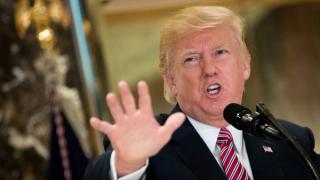The Trump administration announced Wednesday what may be its signature piece of domestic policy – a plan to reshape both corporate and personal taxes. The plan, which contains significant tax cuts, was greeted with joy by Republicans and with consternation by Democrats.
But it is perhaps Australians who should be as concerned as anyone by the plan.
We will, to be blunt, be extremely exposed. Instead of having a 30 per cent rate compared to 35 per cent in the US we will suddenly have a corporate tax rate that is 10 percentage points higher. For any of the commentators who routinely speculate that companies don't make investments based on tax rates, this will be a good test.
Instead of having a 30 per cent rate compared to 35 per cent in the US, Australia will suddenly have a corporate tax rate that is 10 percentage points higher.
Even more troubling for Australia is that so much of the foreign capital that flows to Australia comes from the US. In a recent report for the US Studies Centre and American Chamber of Commerce I highlighted the fact that more than 26 per cent of the foreign investment in Australia – more than $860 billion cumulatively – is from the US. That's about 10 times what China has invested in Australia.
In the stroke of a pen, President Trump could make Australia a radically less attractive destination for US capital.
On the personal tax side the Trump plan involves rationalising seven different tax brackets to three, with rates of 12 per cent, 25 per cent and 35 per cent (or maybe four, if Congress elects to have a special rate for particularly high-income earners). A raft of special deductions will be eliminated, while the so-called "standard deduction" (for those who do not itemise deductions) will be doubled to $24,000 for couples filing jointly. The estate tax will be abolished, child care credits expanded, and a few other tweaks made here and there.
But the really dramatic action is on the corporate side.
The company tax rate would be cut from 35 per cent to 20 per cent. There may be limits placed on the deductibility of interest payments on debt, but capital expenditures could be deducted immediately, rather than amortised over their useful life. And overseas assets from US-owned companies would be "repatriated" and taxed at a one-off low rate—possibly 10 per cent.
If the Trump plan passes then the sucking sound our capital markets hear will be that firehose of money heading back to the US for a once-in-a-generation chance of being taxed at a deeply concessional rate.
Now, the White House making a proposal doesn't mean it will become law. But with a Republican-controlled Congress – many of whose members have campaigned for years on tax cuts – it certainly has a chance. And although it has been estimated by the independent think tank "The Committee for a Responsible Federal Budget" to expand the deficit by $2.2 trillion over the next decade, Republican deficit hawks have been conspicuously silent on that issue. Combine that with the fact that, if passed as a budget resolution it cannot be filibustered in the Senate by Democrats, and it's a fair bet that some version of the plan will be enacted.
And it's not just the potential difference in tax rates – though that's scary enough. The one-off repatriation holiday/discount on foreign assets could have an enormous impact.
Right now – because of the very high 35 per cent tax rate and the fact that profits are not taxed until they are repatriated to the US – US companies have an estimated $2.6 trillion in foreign profits stashed offshore. Those funds are among those invested in countries like Australia. If the Trump plan passes then the sucking sound our capital markets hear will be that firehose of money heading back to the US for a once-in-a-generation chance of being taxed at a deeply concessional rate.
Say what you will about the Trump administration – and I have said a fair bit – this corporate tax plan will make US firms more competitive. That needs to be weighed against the cost, but those who hold power don't seem to care about that. The upshot is that investing in the US will become a lot more attractive. And that means that investing in Australia will become a whole lot less attractive – and precisely for our biggest source of foreign capital.
Meanwhile, we have a tax plan, too. It calls for cutting our rate, over a decade, to 25 per cent. The politics of it mean that it will probably happen only for relatively small companies. Worse still is the introduction of a punitive and arbitrary increase in tax for five of our largest companies (the big banks).
There are no easy answers for Australia. We get a disproportionate amount of our revenue from company tax, so cutting rates entails a big hit to the budget, at least in the short run. Not cutting taxes will make us uncompetitive and risks foreign investment drying up. And we have a dysfunctional parliament that can't get even simple things right.
Advantage Trump. Mr Turnbull to serve.






